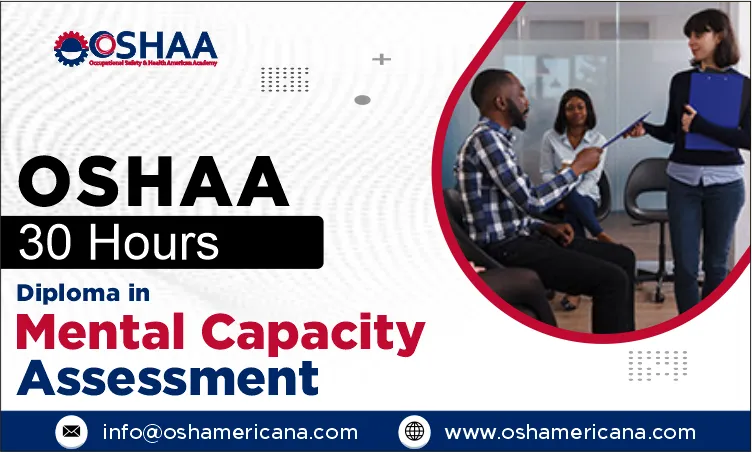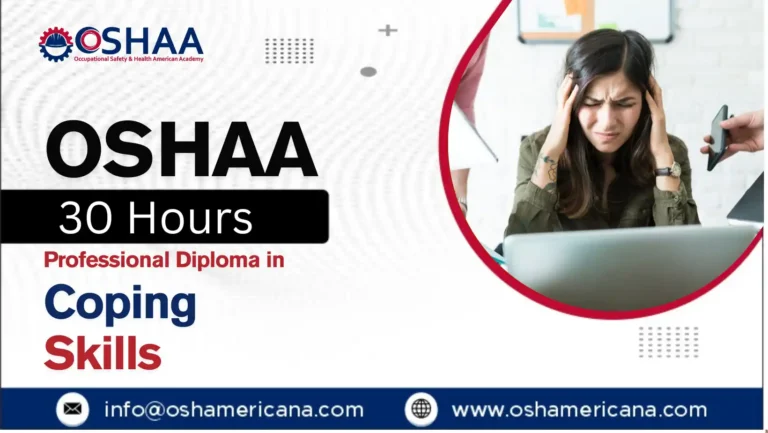Gain the expertise to assess decision-making abilities ethically and legally with the OSHAA 30-Hours Diploma in Mental Capacity Assessment — a professional qualification designed for healthcare and social care professionals.
The OSHAA 30-Hours Diploma in Mental Capacity Assessment is a comprehensive professional training programme designed to develop a deep and practical understanding of how to evaluate an individual’s ability to make informed decisions. This specialized qualification is essential for professionals in healthcare, social work, law, and mental health services who are responsible for safeguarding the rights and well-being of individuals with potential cognitive or decision-making impairments. Through expert-led instruction and evidence-based practices, participants gain the competence to conduct mental capacity assessments that are both ethical and compliant with legal standards.
In modern healthcare and social support systems, the ability to assess mental capacity accurately is not only a professional responsibility but also a legal requirement. The OSHAA 30-Hours Diploma in Mental Capacity Assessment ensures that participants understand the principles of autonomy, consent, and protection embedded within international and UK mental capacity legislation. The course integrates real-world case studies, structured methodologies, and best-practice frameworks that empower professionals to make balanced, informed judgments when supporting individuals who may lack full decision-making ability.
This diploma places strong emphasis on ethical practice, safeguarding, and compliance with regulatory frameworks such as the Mental Capacity Act. Participants learn how to evaluate capacity effectively, document findings appropriately, and ensure that every assessment upholds human dignity and individual rights. The OSHAA 30-Hours Diploma in Mental Capacity Assessment also enhances participants’ ability to communicate sensitively with individuals, families, and multidisciplinary teams, ensuring that assessments are person-centered and transparent.
For professionals seeking to strengthen their understanding of legal and ethical standards in capacity evaluation, this course represents a vital career advancement opportunity. Completing the OSHAA 30-Hours Diploma in Mental Capacity Assessment equips learners with the expertise to contribute to safer, more accountable care environments while promoting best practices in professional decision-making. Whether working in hospitals, community services, residential care, or legal advocacy, graduates emerge with the confidence and qualifications to perform their roles with competence, empathy, and professional integrity.
By earning the OSHAA 30-Hours Diploma in Mental Capacity Assessment, participants not only advance their professional credentials but also play a crucial role in protecting vulnerable individuals and upholding their fundamental rights. This diploma fosters a strong foundation for ethical practice, legal compliance, and continuous professional development, making it an indispensable qualification for anyone involved in the assessment of mental capacity within care and support settings.
OSHAA 30-Hours Diploma in Mental Capacity Assessment
To enroll in the OSHAA 30-Hours Diploma in Mental Capacity Assessment, learners are expected to meet the following criteria:
1. Age Requirement
- Applicants must be at least 18 years of age to register for the OSHAA 30-Hours Diploma in Mental Capacity Assessment. This minimum age ensures that participants possess the maturity and responsibility necessary to understand the ethical, legal, and professional implications of conducting mental capacity assessments.
2. Educational Background
- A minimum of secondary education or equivalent qualification is required to enroll in the OSHAA 30-Hours Diploma in Mental Capacity Assessment. However, candidates with higher education in fields such as healthcare, psychology, social work, nursing, or law are strongly encouraged to apply, as their academic background enhances comprehension of complex ethical and legal principles related to mental capacity evaluation. The diploma is designed to accommodate both new entrants and experienced professionals seeking to deepen their understanding of capacity assessment procedures and regulatory standards.
3. Work Experience
- While prior professional experience is not mandatory, it is highly advantageous for applicants working or aspiring to work in sectors such as healthcare, social care, mental health services, or legal support. Practical exposure to care environments or client-facing roles allows learners to better contextualize the training content of the OSHAA 30-Hours Diploma in Mental Capacity Assessment. Those already employed in relevant fields will find the course particularly beneficial in refining their assessment techniques, ensuring legal compliance, and enhancing their professional decision-making capabilities.
4. English Proficiency
- To successfully complete the OSHAA 30-Hours Diploma in Mental Capacity Assessment, learners must demonstrate adequate proficiency in reading, writing, and speaking English. This requirement ensures that participants can fully engage with course materials, understand complex legal frameworks, and communicate effectively in professional care settings. Since the course includes references to legislation, ethical standards, and case studies, a good command of English is essential for comprehension and successful application of mental capacity assessment principles in real-world scenarios.
Meeting these eligibility requirements guarantees that participants are well-prepared to undertake the OSHAA 30-Hours Diploma in Mental Capacity Assessment and to develop the essential knowledge, skills, and confidence required to conduct ethical and legally compliant capacity evaluations within their professional roles.
Study Units
Learning Outcomes
Introduction to Mental Capacity and Decision-Making (2 Hours)
- Understand the definition of mental capacity and its importance in decision-making.
- Recognise the different factors that can impact an individual’s ability to make decisions.
- Learn the role of mental capacity assessments in ensuring the protection and autonomy of individuals.
Overview of the Mental Capacity Act 2005 (3 Hours)
- Gain an understanding of the key components of the Mental Capacity Act 2005 (MCA).
- Learn how the MCA applies to various decision-making scenarios in healthcare, social care, and legal contexts.
- Understand the implications of the MCA for assessing and supporting individuals with impaired mental capacity.
Key Principles of Mental Capacity Assessments (5 Hours)
- Explore the five key principles of the Mental Capacity Act 2005.
- Learn how to apply these principles when conducting mental capacity assessments.
- Understand the importance of presuming capacity and supporting decision-making abilities.
- Develop the skills to assess mental capacity in a fair and consistent manner.
The Legal Framework for Mental Capacity (4 Hours)
- Gain knowledge of the legal rights of individuals who lack mental capacity and how they are protected.
- Understand the role of the Court of Protection and other legal bodies in mental capacity cases.
- Learn about legal decision-making processes and who has the authority to make decisions for individuals who lack capacity.
Understanding Mental Capacity in Different Contexts (5 Hours)
- Understand how mental capacity assessments apply across various settings, including healthcare, social care, and legal cases.
- Learn how to evaluate mental capacity in diverse contexts, such as financial decisions, medical treatments, and personal care.
- Develop an understanding of how to tailor assessments to meet specific needs in different environments.
Conducting a Mental Capacity Assessment: Step-by-Step (4 Hours)
- Learn the practical steps involved in conducting a thorough mental capacity assessment.
- Understand how to collect relevant information, engage with individuals, and document findings.
- Gain practical skills for assessing an individual’s ability to make specific decisions based on clear criteria.
Ethical Considerations in Mental Capacity Assessments (3 Hours)
- Explore the ethical challenges that can arise when assessing mental capacity.
- Understand the balance between respecting individual autonomy and protecting individuals from harm.
- Learn to navigate difficult situations, such as conflicts of interest or disagreements between professionals and families.
Best Interests Decision-Making and Advocacy (4 Hours)
- Understand the concept of best interests decision-making and how to apply it in practice.
- Learn how to advocate for individuals who lack mental capacity and ensure their rights are protected.
- Gain the skills to work with families, carers, and other professionals to determine what is in the best interests of the individual.
The OSHAA 30-Hours Diploma in Mental Capacity Assessment offers a wide range of professional and practical benefits designed to enhance competence, confidence, and compliance in mental capacity evaluation. This globally recognized qualification provides industry professionals, organizations, and care providers with the expertise to conduct accurate, ethical, and legally compliant assessments. It equips learners with essential skills that promote best practices in healthcare, social work, and legal services while ensuring adherence to international mental capacity standards. By completing this diploma, professionals not only strengthen their individual capabilities but also contribute to safer, more ethical decision-making across care environments.
1. Comprehensive Understanding of Mental Capacity
- Learners gain an in-depth understanding of the legal, ethical, and practical dimensions of mental capacity assessment. The OSHAA 30-Hours Diploma in Mental Capacity Assessment ensures participants can identify, evaluate, and document capacity in line with internationally accepted frameworks, improving decision-making accuracy in professional practice.
2. Strengthened Legal and Regulatory Compliance
- The course provides critical knowledge of legal principles and statutory requirements underpinning mental capacity assessments. Participants learn how to comply with frameworks such as the Mental Capacity Act, ensuring that all assessments are valid, defensible, and aligned with global care standards.
3. Enhanced Professional Competence and Credibility
- Earning the OSHAA 30-Hours Diploma in Mental Capacity Assessment enhances professional credibility, demonstrating a strong commitment to ethical care and accountability. This qualification strengthens career portfolios for healthcare professionals, social workers, and legal practitioners, distinguishing them as trusted experts in their fields.
4. Improved Decision-Making and Ethical Judgment
- Participants develop critical thinking and ethical reasoning skills required for sensitive capacity evaluations. The course teaches professionals how to balance autonomy, protection, and consent when supporting individuals with impaired decision-making abilities.
5. Application of Evidence-Based Assessment Techniques
- The diploma focuses on the application of structured, evidence-based assessment methods. Learners acquire practical tools and frameworks that ensure consistency, accuracy, and transparency in evaluating mental capacity across diverse care settings.
6. Promotion of Human Rights and Dignity
- Through the OSHAA 30-Hours Diploma in Mental Capacity Assessment, participants learn to uphold human rights, ensuring individuals are treated with respect, fairness, and dignity. The course reinforces person-centered approaches that safeguard vulnerable individuals from discrimination and undue influence.
7. Increased Confidence in Professional Practice
- The training instills confidence in handling complex, high-stakes decisions involving capacity assessment. Graduates are equipped to act decisively and responsibly, ensuring that their professional judgments are well-informed and legally compliant.
8. Career Advancement and Global Recognition
- The OSHAA 30-Hours Diploma in Mental Capacity Assessment opens doors to international career opportunities across healthcare, legal, and social care sectors. Employers worldwide recognize the diploma as a mark of professional excellence and ethical competence.
9. Organizational Risk Reduction and Legal Protection
- By training staff through this diploma, organizations can significantly reduce the risk of legal challenges and compliance failures. The course promotes consistent assessment standards, supporting lawful decision-making and safeguarding institutional integrity.
10. Strengthened Communication and Interdisciplinary Collaboration
- Participants enhance their ability to communicate effectively with patients, families, and multidisciplinary teams. This skill is vital for achieving consensus in complex cases and ensuring that assessments are clearly documented and professionally justified.
11. Ethical and Cultural Awareness in Capacity Assessment
- The course emphasizes cultural sensitivity and ethical awareness, preparing learners to conduct fair and unbiased assessments across diverse populations. This ensures inclusivity and adherence to international care ethics.
12. Contribution to Quality Care and Service Delivery
- The OSHAA 30-Hours Diploma in Mental Capacity Assessment contributes directly to improving the quality of care and decision-making processes within organizations. It equips professionals with the tools to implement structured assessment systems that enhance accountability and service delivery.
13. Support for Continuous Professional Development (CPD)
- The diploma provides recognized CPD hours, helping professionals maintain and advance their certifications. Continuous learning through this program ensures participants remain updated with the latest developments in mental capacity law and ethical practice.
14. Improved Safeguarding and Risk Management
- Participants learn how to identify and mitigate risks associated with impaired capacity, ensuring individuals receive appropriate protection and support. The course reinforces safeguarding principles that enhance safety and trust within care environments.
15. Empowerment to Make a Meaningful Social Impact
- Completing the OSHAA 30-Hours Diploma in Mental Capacity Assessment empowers professionals to make a tangible difference in people’s lives. By applying ethical and legally sound assessment practices, graduates promote justice, autonomy, and compassion within their communities and organizations.
Overall, the OSHAA 30-Hours Diploma in Mental Capacity Assessment is more than a qualification—it is a professional transformation tool that strengthens ethical standards, enhances decision-making, and ensures global compliance. It is an essential investment for anyone committed to excellence in mental capacity evaluation, safeguarding, and responsible care.
The OSHAA 30-Hours Diploma in Mental Capacity Assessment is specifically designed for professionals across healthcare, social services, legal, and mental health sectors who are responsible for supporting individuals with impaired decision-making abilities. This comprehensive program is highly relevant to organizations, care providers, and institutions seeking to strengthen their compliance with international standards and regulatory frameworks such as the Mental Capacity Act and OSHA-aligned ethical care protocols. Globally recognized, the diploma ensures that participants develop the expertise required to conduct mental capacity assessments accurately, ethically, and lawfully—enhancing both professional credibility and organizational accountability.
1. Healthcare Professionals
- Doctors, nurses, and allied health practitioners benefit from enhanced understanding of decision-making capacity, ensuring patient care aligns with legal and ethical obligations.
- The OSHAA 30-Hours Diploma in Mental Capacity Assessment equips healthcare staff with structured methods to assess capacity, document findings, and communicate outcomes effectively.
- Learners strengthen their ability to balance patient autonomy with clinical responsibility, supporting best practices in healthcare ethics and compliance.
- The course reinforces OSHA-aligned safety and compliance standards, ensuring quality care within all clinical environments.
2. Social Workers and Care Practitioners
- Professionals in social care and community services learn to identify and assess individuals who may lack capacity to make informed decisions.
- The diploma provides vital tools for managing ethical dilemmas, protecting vulnerable populations, and promoting equality in care delivery.
- Participants gain insights into multidisciplinary collaboration and safeguarding responsibilities under capacity legislation.
- The OSHAA 30-Hours Diploma in Mental Capacity Assessment ensures social workers operate confidently within OSHA-compliant, person-centered frameworks.
3. Mental Health Professionals
- Psychologists, counselors, and mental health nurses gain advanced knowledge of cognitive assessment and legal capacity principles.
- The course enhances understanding of how mental illness or cognitive impairment affects decision-making ability.
- Participants learn to perform and interpret mental capacity assessments within ethical and regulatory boundaries.
- The OSHAA 30-Hours Diploma in Mental Capacity Assessment ensures mental health practitioners deliver compliant, compassionate, and accountable care.
4. Legal Professionals and Advocates
- Lawyers, legal advisors, and advocates develop expertise in interpreting and applying mental capacity laws and ethical guidelines.
- The program strengthens their ability to represent clients with diminished capacity, ensuring legal rights are respected.
- Participants gain confidence in reviewing, validating, and defending mental capacity assessments in legal proceedings.
- The OSHAA 30-Hours Diploma in Mental Capacity Assessment enhances legal compliance and promotes sound decision-making aligned with international law.
5. Nursing Home and Residential Care Managers
- Managers in care settings learn to oversee and implement robust mental capacity assessment procedures across their facilities.
- The diploma enhances their ability to ensure staff compliance with OSHA and mental capacity legislation.
- Participants gain leadership skills in promoting ethical care standards and safeguarding vulnerable residents.
- The OSHAA 30-Hours Diploma in Mental Capacity Assessment ensures effective governance, accountability, and operational excellence in residential care.
6. Occupational Therapists and Rehabilitation Specialists
- Professionals working in rehabilitation and occupational therapy benefit from understanding how capacity impacts patient participation and goal setting.
- The course supports accurate documentation and evaluation of capacity in treatment planning.
- Participants learn to make fair, defensible judgments in line with legal and ethical standards.
- The OSHAA 30-Hours Diploma in Mental Capacity Assessment promotes compliance, risk reduction, and improved therapeutic outcomes.
7. Human Resource and Compliance Officers
- HR and compliance professionals gain insights into supporting staff training and compliance in care organizations.
- The course strengthens their ability to develop and enforce policies aligned with OSHA and capacity legislation.
- Participants understand how proper assessment practices mitigate organizational risks and legal liabilities.
- The OSHAA 30-Hours Diploma in Mental Capacity Assessment ensures organizations maintain safe, ethical, and fully compliant operations.
8. Emergency and Paramedical Staff
- Paramedics and emergency responders learn how to assess decision-making ability quickly and ethically in urgent care scenarios.
- The program enhances their judgment in balancing patient safety with autonomy under high-pressure conditions.
- Participants gain practical techniques for immediate, accurate assessments in compliance with health and safety standards.
- The OSHAA 30-Hours Diploma in Mental Capacity Assessment supports fast, ethical decision-making in emergency environments.
9. Academic and Training Professionals
- Educators and trainers in healthcare or social care programs can integrate mental capacity assessment principles into their teaching.
- The course equips them with the theoretical and legal frameworks needed to develop compliant curricula.
- Participants enhance their instructional quality by aligning education with OSHA and international ethical standards.
- The OSHAA 30-Hours Diploma in Mental Capacity Assessment ensures academic excellence and knowledge dissemination within the professional community.
10. Policy Makers and Organizational Leaders
- Senior leaders and decision-makers in healthcare and social sectors benefit from understanding the strategic importance of capacity assessment.
- The course provides insights into developing compliant policies, governance systems, and organizational frameworks.
- Participants learn how to ensure ethical oversight and consistent implementation of mental capacity practices.
- The OSHAA 30-Hours Diploma in Mental Capacity Assessment strengthens leadership capacity for ethical, safe, and effective organizational management.
By enrolling in the OSHAA 30-Hours Diploma in Mental Capacity Assessment, participants from diverse professional backgrounds gain the specialized skills, legal awareness, and ethical confidence to perform and oversee capacity assessments responsibly. This internationally recognized qualification empowers professionals and organizations to maintain compliance, promote human rights, and achieve excellence in care delivery and operational integrity worldwide.







